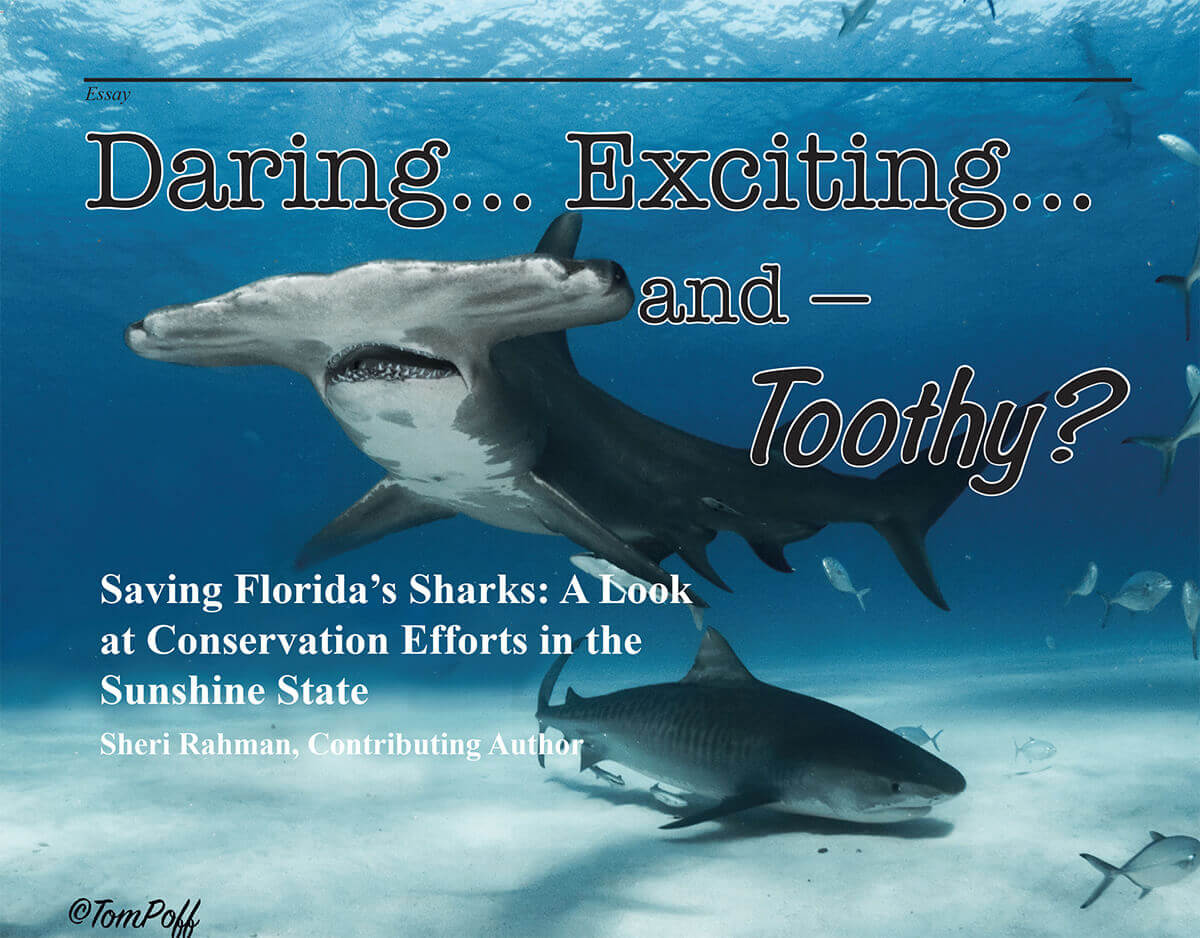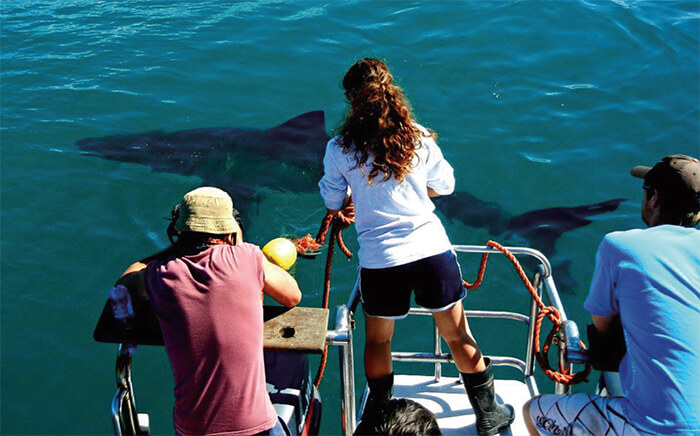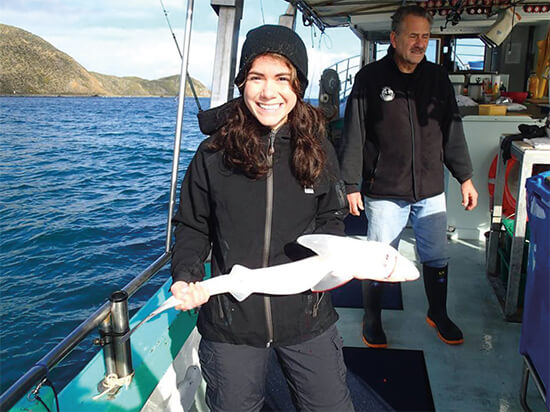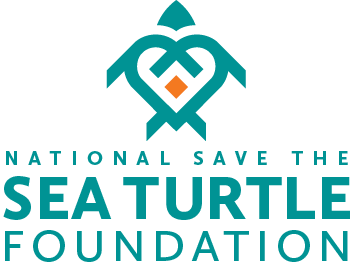
Daring...exciting...toothy...these words describe the many shark-related thrillers that often bring to mind vivid images of dramatic and terrifying scenes. Portraying sharks as the monster, such films can be harmful to the innocent creatures swimming in our oceans because they evoke fear in people who play at the beach or dive over a coral reef. Some individuals may even find themselves worrying about what’s lurking beneath the waves — and if it’s hungry. But in reality, sharks are some of the planet’s most misunderstood creatures, an issue worsened by the media’s love for drama and violence.
As an incredibly attractive location for marine life, Florida provides the ideal habitat for many sharks that suffer from this PR nightmare. In fact, a wide variety of shark species make our waters their home, including the protected hammerheads and angel sharks. In August 2013, for example, researchers at Ocearch in Cape Cod, Massachusetts, captured and tagged a 14-foot, 2,300-pound white shark named Katherine. Since that day, Katherine has traveled nearly 40,000 miles to visit Florida each year. Most recently, this incredible fish was spotted off the coast in Cape Canaveral.
Because of their diversity and the critical role each shark plays in the ecosystem, conservation efforts in the Sunshine State have become more important than ever. Thankfully Ocearch, which aims to monitor marine life and thereby promote conservation, is not the only organization working to save sharks. Rather, many individuals, groups, and businesses are working together to dispel the terrifying myths surrounding these animals. By promoting better education and awareness, these actions provide new knowledge, such as insights into their behavior, and increase public understanding of their not-so-scary nature.
The Issues Facing Sharks
Although individual sharks may be blissfully unaware of the issues they face, their existence as a whole is largely threatened by human actions. Commercial shark finning — a practice that involves capturing sharks, cutting off their fins, and discarding the carcass — is considered a threat that’s not only harmful to shark populations but also extremely wasteful. Researchers have estimated that this practice leads to the death of over 100 million sharks per year.
Even if sharks are not targeted by commercial fishing vessels, they may still be vulnerable as bycatch. A fishery that targets tuna or billfish, for instance, will likely catch some shark species in their nets. And while this isn’t intentional, it can still lead to the deaths of many sharks, decimating their populations. Other human impacts have also led to the reduction of shark populations, including habitat degradation. This all-encompassing term refers to the destruction of areas where sharks can survive, often as a result of climate change, pollution, or physical destruction.
But why are sharks so vulnerable - and why do they need saving from these issues? Sharks can live pretty long lives (the oldest living vertebrate is a Greenland shark that’s estimated to be at least 300 years old!), it takes them years to mature, and when they do reproduce, they usually have only a few pups. Collectively, these traits are known as life-history characteristics, which have been adapted over time and allow the sharks to fulfill a specific niche in their environment. But when an exorbitant number of sharks are killed each year as a result of human activity, it reduces their ability to survive long enough to reproduce. And if they can’t reproduce, then it’s only a matter of time before their numbers run out. Thankfully, there are a few heroes working to raise awareness and save the sharks.
Spreading Awareness of Shark Products

Melissa Marquez helping bring a great white shark up for fin ID photos.
Photo Provided by Melissa Marquez.
Photo Provided by Melissa Marquez.
Although shark finning is prohibited on United States fishing vessels, the trade of shark fins remains legal in all but 12 states. Miami is a leading import/export nexus of the trade, according to the website for Save the Sharks, an organization led by Susana Ramirez. Dedicated to improving public awareness of such issues, Ramirez relies on a variety of tools, such as education, outreach, and general conservation. These tools allow her to focus much of the organization’s efforts on getting shark products out of stores and restaurants. “We find it best to focus on specific issues,” Ramirez explains, indicating that they can then achieve better results. Through Save the Sharks, Ramirez reminds people that shark meat poses health issues. In particular, the meat contains high levels of mercury which are typically over the FDA’s action level of one part per million. In addition, the ethical, conservation, and sustainable fishery issues involved in selling shark products can be a major problem.
According to Save the Sharks, the shark fin trade is one of the leading causes of mortality in these animals - and there are simply no sustainably sourced shark fins available. If you ever find non-food shark products like shark teeth, bracelets, or necklaces, Ramirez warns that these aren’t necessarily safe to purchase either, stating “they are almost never ethically sourced.” With a focus on getting shark products off the menu, Ramirez and her team are working on relaunching their “Report an Entity” program, which will allow conservation-savvy consumers to take action whenever they find shark products in stores or restaurants.
Giving Sharks a Voice Through Social Media
Currently residing in Sydney, Australia, Melissa Cristina Marquez began her own personal mission to save sharks from the halls of her college in Sarasota, Florida. It was here that she originally founded The Fins United Initiative (fondly referred to as TFUI), which is an education and conservation program geared towards uniting lovers of sharks and their relatives around the world.
"Take out these predators, and it has been proven that the ecosystem suffers."
Through this organization — which hopes to soon have its own home base and a fleet of educational vehicles — Marquez is working to help everyone understand the importance of sharks. By partnering with educational institutions and other organizations, she has designed novel techniques that promote participation and learning.
But her goals go far beyond providing easily accessible information. Marquez also strives to give sharks a voice through her social media accounts. “Sharks are one of the most important predators in our oceans, which is the largest ecosystem making up 75% of our planet,” Marquez stated. “Take out these predators, and it has been proven that the ecosystem suffers. If you don’t protect sharks, then you aren’t protecting our oceans”. Whether she’s working through TFUI or tweeting about the latest shark research, she hopes to help us all understand the importance of these animals so that we can better promote their well-being.

Melissa with a spiny dogfish caught in Wellington,
New Zealand. Photo: Provided by Melissa Marquez.
New Zealand. Photo: Provided by Melissa Marquez.
In addition to promoting awareness of the sharks themselves, Marquez also shines her spotlight on the other end of the diver’s mask - the people who research them. “I want people to go to my various channels, be it TFUI or my Twitter account, and see the diversity within the STEM fields that the media doesn’t typically show,” she stated. As a strong advocate for diversity and inclusivity, Marquez devotes her time working with two sides of the same coin. Not only is she saving sharks by raising awareness and promoting education about their role in the ecosystem, but she is also giving the diverse researchers who study them a voice.
How Can You Help?
Developing a better understanding of sharks and the key role they play in the environment is one of the most important things an individual can do to save sharks. But if you want to take more action, there a few ways anyone can help these incredible creatures. One of Melissa Marquez’s favorite tips is to remind individuals “to eat sustainable seafood” by avoiding unsustainable seafood. Susana Ramirez also recommends avoiding shark foods, including shark steak, shark meat, and shark fin soup. Additionally, remember to read the ingredients list whenever purchasing fragrances, medications, or oils, because “these products may have shark in them,” Ramirez advises. Marquez offers other great ways to help sharks - and the ocean as a whole. Consider spending the day with your family volunteering at reputable nonprofits in the area, or try writing to policy-makers to ask what they’re doing to help the oceans.
It is often all too easy to overlook the importance of sharks in the ecosystem or to feel overwhelmed by the complexities of saving them. But the work of Melissa Cristina Marquez and Susana Ramirez proves just how important — and possible — it is to get started. The mission to save Florida’s sharks has already begun — will you be a part of it?
Helping Sea Turtles Survive for 39 Years
A NON-PROFIT ORGANIZATION
State of Florida Registration Number CH-2841 | Internal Revenue Code 501 (c) (3)
Web Design & Development by Web Expressions, LLC

